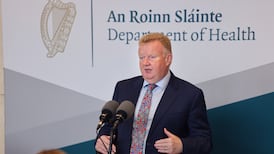There has been a “significant” reduction in the use of restraint and seclusion of patients in Irish mental health centres over the last seven years, a new report has found.
Since January 1st, 2023, the rules around the use of restrictive practices were changed to prioritise “dignity, autonomy and wellbeing of services users”.
The changes were the latest step by the State to move towards a human rights-based approach to mental health treatment in Ireland.
On Thursday, the Mental Health Commission (MHC), which regulates the sector, published a report on the prevalence of restrictive practices.
READ MORE
According to the data, the number of people who were secluded fell from 473 in 2023, to 434 in 2024. This is a significant drop on 2022 – the last year when the old rules were in place – when 620 people were secluded.
This equals a 30 per cent reduction in the number of people secluded between 2022 and 2024, and a 43 per cent reduction from 2018 to last year. Seclusion is defined as a person being unable to leave a room.
The number of people physically restrained also decreased, falling from 1,078 people in 2022 to 879 in 2023 and 844 in 2024. This represents a 22 per cent decrease since 2022 and a 30 per cent decrease since 2018.
Physical restraint is when one or more individual restrains a person, while mechanical restraint is the use of devices or bodily garments that prevent or limit a patient’s movement.
Two approved centres reported use of mechanical restraint in 2023, and only one in 2024. Six residents were restrained over nine episodes in 2023, and five residents over 10 episodes last year.
[ Why is mental health so much worse among Irish youths than adults?Opens in new window ]
All episodes in 2023 and 2024 were described as being used for “transfer purposes to and from court/hospital” where there was an immediate threat of serious harm.
The January 2023 regulations from the MHC also banned the use of mechanical restraint on children. The total number of restrictive practice episodes in Child and Adolescent Mental Health Services (CAMHS) fell from 2,608 episodes in 2018 to just 238 in 2024.
There was a 57 per cent decrease in physical restraint episodes in Camhs between 2023 and 2024, and an 80 per cent decrease in seclusion episodes.
Prof Jim Lucey, the State’s inspector of mental health services, said children are “specifically protected” from restrictive practices in Irish mental health care.
“Seclusion and physical restraint can have adverse implications for their emotional development. This approach, underpinned by the principles of trauma-informed care, has been further enhanced by the revised regulations.
“Our report documents a profound decline, showcasing the immense progress we have made by working together with staff in services in protecting a particularly vulnerable group.”














